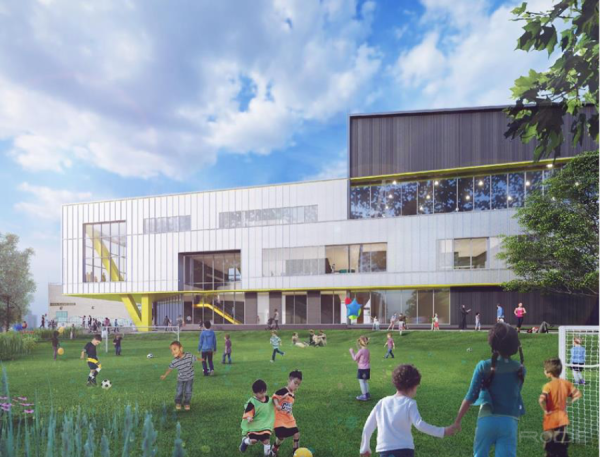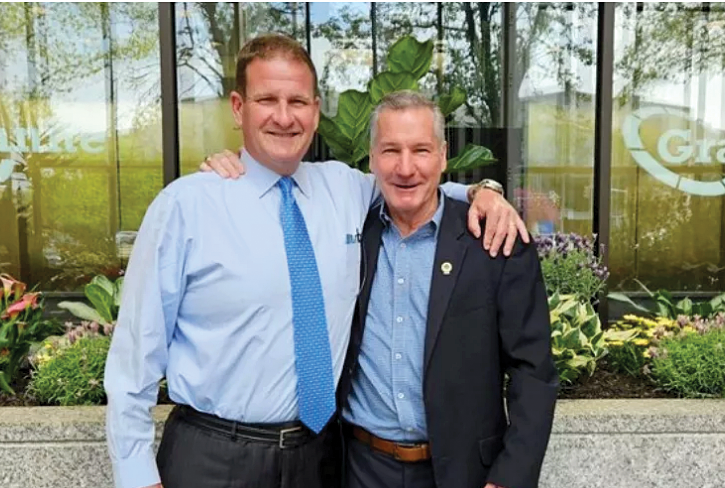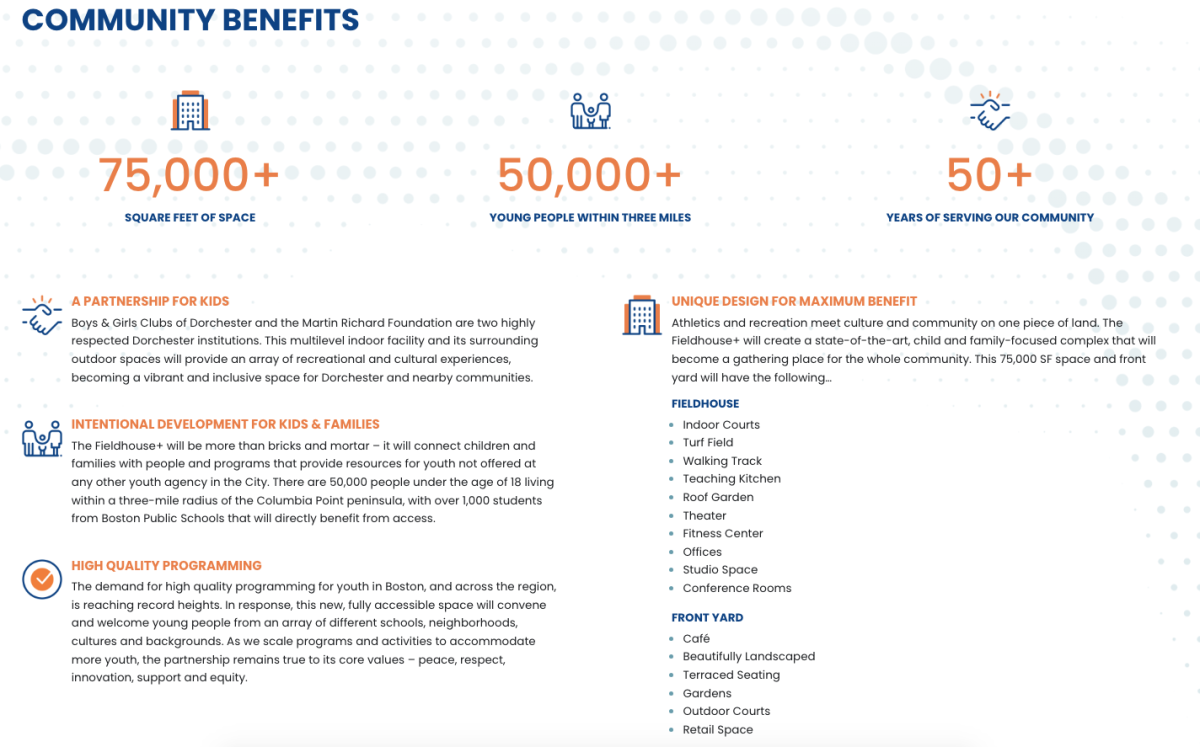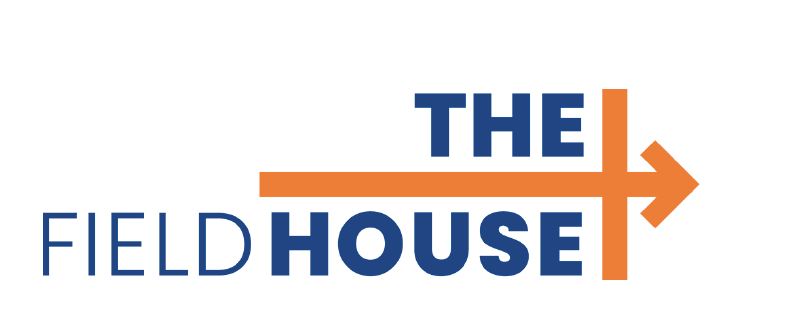May 29, 2024

A rendering shows an exterior view of the Fieldhouse+, the $70 million facility that will be built on Mount Vernon Street. The building will serve BPS students and members of the Boys and Girls Clubs of Dorchester.
Image courtesy RODE Architects
For six years now, it has existed as a dream project, but just beyond the grasp of the people who conjured it up in the first place. But now, the ambitious plan to build a $70 million state-of-the-art indoor facility to house athletic fields, practice courts, and other programs for city kids and teens is finally within grasp, with hopes of an actual groundbreaking before the year’s end.
This unique partnership between the Boys and Girls Clubs of Dorchester (BGCD) and the Martin Richard Foundation has new funders and a new name, FieldHouse+, a nod to the enhanced programs that will be housed in and around the 75,000 square foot building on Columbia Point.
Last month, the effort to raise the private dollars needed to finance the construction got its biggest boost to date, a $9 million gift from Rob and Karen Hale, who had already promised $1 million to the cause. Their $10 million commitment not only put the BGCD-led capital campaign over the halfway mark, according to president and CEO Robert “Bob” Scannell, but it also unlocked the chance to bring in millions more in philanthropy that have been waiting for confirmation of the project’s viability.

Philanthropist Robert Hale, left, and his wife Karen donated $10 million for the FieldHouse+ facility, a joint project by the BGCD and the Martin Richard Foundation. Hale is shown with Bob Scannell, the longtime CEO and president of BGCD. Photo courtesy WBZNews Radio
“In terms of momentum, we’re in the best possible place right now and we’re trying to capitalize on that,” said Scannell. “Rob and Karen Hale’s donation is almost unheard of and it was spectacular. I can also say that it has already inspired millions in other commitments. We have more funders willing now to meet with us, because once we get halfway there, these funders are stepping and supporting us because then the project becomes real.”
The work to prepare for this breakthrough moment has been arduous and carefully thought out. The club and the foundation joined forces to secure a public bid to lease the Mount Vernon Street land from the city of Boston five years ago and won necessary approvals from the Boston Planning and Development Agency in March 2022. A contractor – Lee Kennedy Co., Inc. – has already been hired and RODE Architects, the Dorchester-rooted firm, has fully designed the building. Countless meetings with advisory groups from the surrounding community— including BGCD youth members— helped to inform their work.
Bill Richard, who is the co-founder along with his wife Denise of the Martin Richard Foundation named for their late son, credits those community voices with the project’s evolution.
“It’s made it more expensive and more challenging in terms of fundraising, but we’ve embraced that,” said Richard. “And the people donating have respected our decision to not scale back on the commitment we’ve made to the community. We stayed the course.
Richard continues: “And the The FieldHouse+ name is a nod to Dorchester, to our desire to welcome people of all abilities, and that it’s more than just athletics. The wrap-around services, the family services that are hallmarks of the club are going to continue alongside team comptetion and team play, all under one roof. That is something we’re really looking forward to blending.”
The Fieldhouse+ Animation from Boys & Girls Clubs of Dorchester on Vimeo.
Critical to the success and the overall mission is an agreement with the Boston Public Schools to maximize use of the new building for the students at the current McCormack School, which will soon be renamed for the late education and civil rights leader Ruth Batson. Scannell says the school, which will have as many as 1,000 students through a long-planned merger with Boston Community Leadership Academy (BCLA), will have use of the facility from 7 a.m. until dismissal for physical education and other programs. In reality, the student population will have full-use of the facility along with other members of the BGCD, because all McCormack-BCLA students will automatically be club members, free of charge.
During after-school hours, the facility will be “like a regular Boys & Girls Club.” Except, as Scannell says, this brand new building will be a clubhouse “on steroids,” with indoor turf fields, basketball and racket courts, a theatre, kitchen space, and other programming options unlike anything else that exists in the city of Boston.

“We ultimately decided to call it Fieldhouse+ and we like it. And the feedback from the community has just been spectacular — and from across greater Boston, too. From our perspective, we can serve thousands more kids by building a fourth club.
This will accommodate so many teens based on the facilities we’re building, whether it’s the teaching kitchen or the theater, or the athletic spaces. So, we’ll make a real priority of serving more teens,” said Scannell.
Craig Welton, who is the BGCD’s chief development officer, notes that the facility will also be fully inclusive, fulfilling what’s already a core mission of the Dorchester clubs: serving kids and teens who are often left on the sidelines due to disabilities.
“Everything’s being purposely built to be fully accessible and fully inclusive,” says Welton. “We have very strong ‘everything’ programs here, but we could take the inclusion program here out of the club, stand it up on its own, and it’d be among the best in the state, by far. I think it’ll just be amplified in this new building. And the fact that we’re going have this state-of-the-art facility for everybody, for all backgrounds, for all abilities, is really something that’s unique.”
After hours, the facility will open its doors for rentals to leagues and teams that crave indoor practice and competition spaces in the city. “It’s a model that’s going to work for us and it’ll get used around the clock. So, we’re pretty excited about that. There’s really nothing like it in the city,” says Scannell. “The demand’s going to be off the charts, whether it’s for the turf field, the basketball courts. And since we started thinking about this project, all of a sudden pickleball becomes a thing. So, we’ll accommodate that as well.”

The demand is huge and will help finance ongoing operations without hindering access for the target audience: neighborhood kids. “We want to replicate what we’re already doing successfully, and we want to do it in a bigger and more meaningful way,” says Scannell. “This facility will be able to serve thousands of more kids. So, that’s the drill. Get more kids in our doors, serve them, give them the opportunities that any of our members have now.
“I think it’s something that we’ll try to share with as many people as possible, because we really are going to meet kids in their families with where they are. If a kid has behavioral issues, there’s going to be sensory rooms, because everybody needs a break sometimes. If a kid uses a wheelchair, we’ll have rims that will come down. We’ll have full access to every single floor.”
The BGCD team says they don’t need – or expect – to have the full $70 million in the bank before they start work, ideally before next winter sets in. The Hale gift, they believe, will accelerate their timeline to get this facility underway.
“What we’re looking at now is at what point in time do we have the right cash to be able to start this and carry through X amount of months while we continue to fundraise?” said Scannell. We don’t need to have it all committed and, and in the bank.”
“I’d like to think that we could begin construction before this year ends. Maybe December, maybe sooner if we’re lucky. And then, it is scheduled to be a 17- month build. So once we get going, it’s a fairly quick and a pretty straightforward build. So, we’re anxious to get in the ground.”
Prior to this project, the BGCD, which will celebrate its 50th year in July (see related story in this edition) has never had an individual $1 million donor. Through this project, they’ll soon have many, but Scannell notes that the goodwill of smaller supporters continues to be critical, too.
“It’s the person down the street who sends us a $25 check, all the way up to $10 million, and everything in between. Right now, our operating budget [for the existing clubhouses] in rough numbers is $10 million to operate every year. So, we’ve got that going on with this, but we’ve made a lot of friends along the way.
“It has been a long haul, but there have been a million good stories along the way and plenty of challenges, too. We really want to be in a place where we’re a hundred percent comfortable. I see that it’s on the horizon.”


